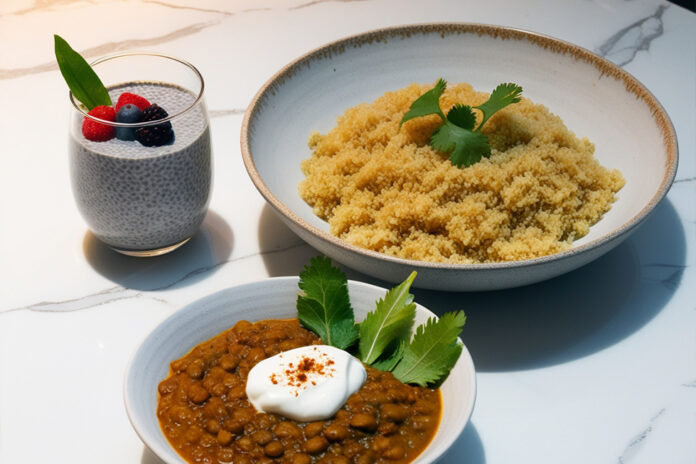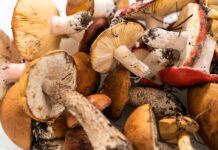
Plant-based diets are growing in popularity, and for good reason—they’re associated with numerous health benefits, including lower risks of heart disease, improved weight management, and a reduced environmental footprint. However, like any dietary choice, going plant-based comes with its own challenges. Women, especially, need to be cautious about meeting specific nutrient requirements, ensuring proper protein intake, and avoiding digestive discomfort. In this article, we’ll explore the five major pitfalls of a plant-based diet and provide practical strategies to overcome them. Plus, we’ve included a balanced seven-day meal plan to keep you nourished and energized!
Pitfall 1: Nutrient Deficiencies
Certain nutrients like vitamin B12, iron, zinc, iodine, and omega-3 fatty acids can be harder to obtain from a plant-based diet. These deficiencies can lead to fatigue, weakened immunity, and other health issues if not properly addressed.
How to Overcome It
- Vitamin B12: Since B12 is found primarily in animal products, consider taking a daily supplement or consuming fortified foods like plant-based milk, cereals, and nutritional yeast.
- Iron: Focus on iron-rich foods such as lentils, spinach, chickpeas, and fortified grains. Pair these with vitamin C-rich foods (e.g., oranges, bell peppers) to enhance absorption.
- Zinc: Incorporate zinc-rich foods like pumpkin seeds, quinoa, and tofu into your meals. If you still feel deficient, consider supplementation.
- Iodine: Use iodized salt in moderation or include seaweed (nori, wakame) in your diet occasionally.
- Omega-3 Fatty Acids: Add sources of alpha-linolenic acid (ALA) like flaxseeds, chia seeds, and walnuts, and consider algae-based omega-3 supplements for DHA and EPA.
Pitfall 2: Ensuring Adequate Protein Intake
One common concern is that plant-based proteins may not provide all essential amino acids. Unlike animal proteins, plant proteins often need to be combined for a complete amino acid profile.
How to Overcome It
- Variety is Key: Include a wide range of plant proteins such as lentils, beans, tofu, tempeh, seitan, and quinoa.
- Combine Foods: Pair grains with legumes (e.g., rice and beans, peanut butter on whole-grain bread) to ensure a complete amino acid profile.
- Consider Protein Powders: If you have high protein needs, plant-based protein powders (pea, hemp, or rice protein) can be helpful.
Pitfall 3: Low Caloric Density
Plant-based diets often emphasize fruits, vegetables, and whole grains, which are low in calories but high in volume. While this can be beneficial for weight loss, active women may struggle to meet their energy needs.
How to Overcome It
- Incorporate Energy-Dense Foods: Add healthy fats like avocados, nuts, seeds, and coconut oil to your meals.
- Snack Smart: Snack on trail mix, nut butter with fruit, or smoothies with added oats and nut butter.
- Use Healthy Oils: Cook with olive oil or drizzle it over salads to boost your caloric intake.
Pitfall 4: Digestive Issues
A sudden increase in fiber from fruits, vegetables, and legumes can cause bloating and digestive discomfort, especially for those unaccustomed to high-fiber diets.
How to Overcome It
- Gradual Transition: Slowly increase fiber intake over a few weeks to allow your digestive system to adjust.
- Stay Hydrated: Drink plenty of water throughout the day to aid digestion.
- Cook Your Veggies: Cooking vegetables can make them easier to digest compared to eating them raw.
- Incorporate Fermented Foods: Include kimchi, sauerkraut, miso, and probiotic-rich foods to support gut health.
Pitfall 5: Over-reliance on Processed Foods
Many plant-based eaters rely heavily on processed vegan foods, which can be high in sodium, and unhealthy fats, and lack essential nutrients.
How to Overcome It
- Focus on Whole Foods: Prepare meals using whole grains, fresh vegetables, legumes, and nuts.
- Limit Processed Alternatives: Save processed vegan products like burgers and sausages for occasional use.
- Choose Minimally Processed Options: Opt for minimally processed proteins such as tofu, tempeh, and lentils.
7-Day Plant-Based Meal Plan for Women
This meal plan ensures balanced macronutrients, adequate protein, and essential micronutrients like iron, calcium, zinc, and omega-3s.
Day 1
Breakfast: Chia pudding with berries & flaxseeds
- 3 tbsp chia seeds soaked in 1 cup fortified plant-based milk
- 1 cup mixed berries
- 1 tbsp ground flaxseeds
Snack: Apple with almond butter
- 1 apple + 2 tbsp almond butter
Lunch: Quinoa bowl with roasted vegetables
- 1 cup cooked quinoa
- 1 cup roasted broccoli, bell peppers, and zucchini
- Drizzle with tahini dressing
Snack: Roasted chickpeas
- ½ cup roasted chickpeas (seasoned with paprika)
Dinner: Lentil curry with brown rice & steamed spinach
- 1 cup cooked brown rice
- 1 cup lentil and spinach curry
Day 2
Breakfast: Tofu scramble with veggies & whole-grain toast
- ½ block crumbled tofu sautéed with spinach, bell peppers, and onions
- 2 slices whole-grain toast
Snack: Handful of nuts & dried fruit
- ¼ cup almonds + ¼ cup dried cranberries
Lunch: Chickpea salad wrap
- Whole-grain wrap filled with mashed chickpeas, diced cucumber, and tomato
- Drizzle with lemon-tahini dressing
Snack: Spinach-banana smoothie
- 1 cup spinach, 1 banana, 1 tbsp chia seeds, 1 cup fortified plant-based milk
Dinner: Sweet potato & black bean tacos
- 2 small whole-grain tortillas
- ½ cup black beans, roasted sweet potatoes
- Topped with salsa and avocadoDay 3
Breakfast: Oatmeal with banana & walnuts
- ½ cup oats cooked in plant-based milk
- 1 sliced banana
- 2 tbsp walnuts
Snack: Carrot sticks with hummus
- 1 cup carrot sticks + 3 tbsp hummus
Lunch: Mediterranean grain bowl
- 1 cup cooked farro or barley
- ½ cup roasted chickpeas, cucumber, and tomatoes
- Drizzle with olive oil and lemon
Snack: Dark chocolate & almonds
- 1 oz dark chocolate + ¼ cup almonds
Dinner: Stir-fried tofu with brown rice
- 1 cup stir-fried vegetables (broccoli, bell peppers, snap peas)
- ½ block tofu
- 1 cup brown rice
Day 4
Breakfast: Smoothie bowl with berries & granola
- 1 cup spinach, 1 banana, ½ cup mixed berries, 1 tbsp chia seeds (blended)
- Topped with granola
Snack: Roasted edamame
- ½ cup roasted edamame
Lunch: Lentil soup with whole-grain bread
- 1 cup lentil soup
- 1 slice whole-grain bread
Snack: Orange & pumpkin seeds
- 1 orange + 2 tbsp pumpkin seeds
Dinner: Vegan Buddha bowl
- 1 cup quinoa
- 1 cup roasted sweet potatoes, chickpeas, and steamed broccoli
- Drizzle with tahini
Day 5
Breakfast: Whole-grain pancakes with peanut butter
- 2 small whole-grain pancakes topped with 2 tbsp peanut butter
Snack: Banana & almond butter
- 1 banana + 2 tbsp almond butter
Lunch: Vegan sushi rolls
- 4 small sushi rolls filled with cucumber, avocado, and carrot
- Served with soy sauce and pickled ginger
Snack: Trail mix
- ¼ cup mixed nuts and seeds
Dinner: Spaghetti with lentil marinara
- 1 cup whole-grain spaghetti
- 1 cup marinara with cooked lentils
Day 6
Breakfast: Overnight oats with blueberries & chia seeds
- ½ cup oats + 1 tbsp chia seeds + 1 cup fortified plant-based milk (soak overnight)
- Topped with ½ cup blueberries
Snack: Rice cakes with hummus
- 2 rice cakes + 3 tbsp hummus
Lunch: Vegan burrito bowl
- ½ cup brown rice
- ½ cup black beans, corn, diced tomatoes, and avocado
Snack: Handful of mixed nuts
- ¼ cup mixed nuts
Dinner: Stuffed bell peppers
- 2 bell peppers stuffed with quinoa, black beans, and vegetables
Day 7
Breakfast: Smoothie with spinach, berries, & flaxseeds
- 1 cup spinach, 1 banana, ½ cup mixed berries, 1 tbsp flaxseeds, 1 cup plant-based milk
Snack: Celery sticks with peanut butter
- 1 cup celery sticks + 2 tbsp peanut butter
Lunch: Vegan chili with cornbread
- 1 cup vegan chili (kidney beans, black beans, tomatoes, spices)
- 1 small piece of cornbread
Snack: Fresh fruit salad
- 1 cup mixed fruits (apple, orange, grapes)
Dinner: Grilled veggie platter with quinoa
- Grilled eggplant, zucchini, and bell peppers
- 1 cup cooked quinoa
This meal plan provides:
- Adequate protein from legumes, tofu, quinoa, and seeds
- Iron & zinc from lentils, chickpeas, pumpkin seeds, and fortified grains
- Calcium from fortified plant-based milks and leafy greens
- Omega-3 from flaxseeds, chia seeds, and walnuts
- Vitamin B12 from fortified foods or supplements











